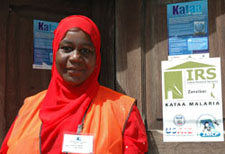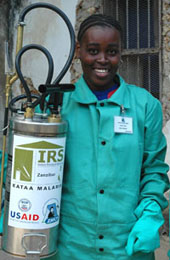IRS, or “indoor residual spraying,” refers to one component of the U.S. President’s Malaria Initiative (PMI), a strategy implemented through USAID that is designed to eliminate malaria as a public health problem.
Mariam Juma has been particularly inspired by Jamila Hassan. As a 25-year old HIV/AIDS advocate and educator in the Zanzibar Urban District, she was eager to include malaria prevention in her HIV/AIDS curriculum to help control and prevent malaria deaths in her community. Mariam and 454 other IRS workers will canvas the islands of Unguja and Pemba with the goal of spraying more than 250,000 homes. Working seven days a week will be an exhausting task, but all the workers are enthusiastic and repeatedly shout “Udhibiti wa mbu kataa malaria!” or “I reject malaria, control mosquitoes!”
On July 9, 2006, a $2 million campaign was launched with the goal of spraying most homes in the Zanzibar archipelago before the start of the short rains that begin in October. In a speech at the launch ceremony, Ambassador Michael Retzer listed several successes of the PMI on Zanzibar, including an estimated 7,700 fewer malaria cases in health facilities in the month of May compared with the previous year and 200 fewer deaths of children under age 5. “You are definitely on your way to a better, healthier future,” said Retzer.
Sub-Saharan Africa bears the brunt of the malaria burden, and in Tanzania it is estimated that 80,000 children under age 5 die from the disease each year. In response to this epidemic, President George Bush launched PMI in June 2005. PMI is dedicated to reducing malaria-related deaths in target countries by 50 percent. In Tanzania, PMI is helping to purchase and promote the use of long-lasting insecticide-treated nets, IRS, fast and effective treatment with new artemisinin-based drugs, and intermittent preventive treatment of malaria during pregnancy.


